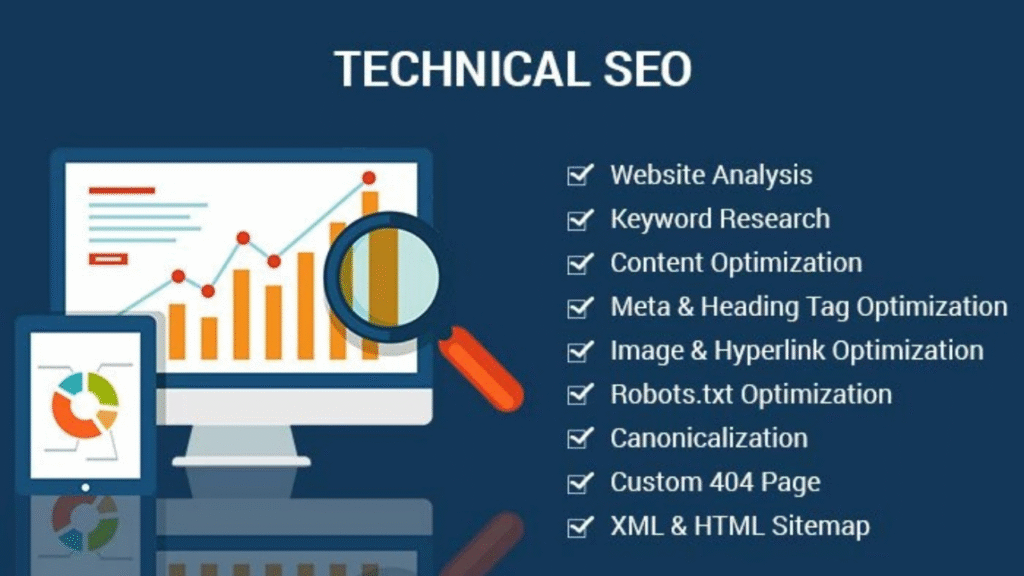When you listen the term “Technical SEO,” does it sound like a outside dialect? You’re not alone. For numerous Technical SEO Made Simple, the thought of jumping into the backend of a site can be scaring. But the truth is, understanding the essentials of Technical SEO can be a game-changer for your site’s execution. And figure what? You don’t require to be a designer to get it right.
What Is Technical SEO?
Let’s begin with the essentials. Technical SEO is all around optimizing the foundation of your site. It’s like making beyond any doubt the establishment of your house is strong some time recently you begin brightening. Without it, indeed the most lovely websites can battle to rank on Google.
Why Is Technical SEO Important?
Imagine building a dazzling site with breathtaking visuals and compelling substance, as it were for it to be imperceptible to look motors. Baffling, right? That’s where Technical SEO comes in—it guarantees your location is crawlable, indexable, and available to both clients and look engines.
Key Components of Technical SEO Made Simple
Site Speed Optimization
Fast-loading websites aren’t fair a nice-to-have—they’re fundamental. Google prioritizes speed, and clients won’t adhere around if your location takes ages to load.
Mobile-Friendliness
With more clients browsing on versatile gadgets, having a mobile-responsive location isn’t discretionary. It’s vital for both client involvement and SEO rankings.
Secure Attachments Layer (SSL) Certification
You’ve likely seen websites labeled as “Not Secure.” That’s a ruddy hail for clients and look motors alike. Including SSL encryption (HTTPS) secures client information and boosts your SEO.
XML Sitemap
Think of an XML sitemap as a guide for look motors. It tells Google and other look motors precisely what pages exist and how to reach them.
Robots.txt Optimization
This minor record carries huge weight. It instrument look motors on which pages to creep and which to overlook, making a difference you oversee your site’s visibility.

Organized Information Markup
Structured information makes a difference look motors get it the substance on your page, improving how your location shows up in look comes about with wealthy snippets.
Canonical Tags
Canonical labels anticipate copy substance issues by signaling the essential form of a page to look engines.
Settling Broken Links
Broken joins are like dead-ends on a outline. If a client or a look motor experiences one, it disturbs the travel. Frequently reviewing your location for broken joins can keep that way smooth.
Optimizing URL Structures
Short, expressive URLs are simpler to perused and rank way better on look motors. Keep them clean and pertinent to the page content.
Empowering Browser Caching
Browser caching lets your location store a few data on a user’s gadget, making your location stack speedier when they return. It’s a speedy win for page speed.
Common Technical SEO Botches to Avoid
Ignoring portable optimization
Overlooking location speed
Not setting up a appropriate XML sitemap
Failing to settle broken links
Forgetting around SSL encryption
How to Review Your Location for Technical SEO Made Simple
Regularly inspecting your site for Technical SEO mistakes is like taking your car for a tune-up. Instruments like Google Look Comfort, SEMrush, and Ahrefs can offer assistance you pinpoint and settle issues.
The Future of Technical SEO
With the rise of AI and machine learning, Technical SEO Made Simple is as it were going to gotten to be more vital. Look motors are getting more astute, and so ought to your optimization strategies.
Read More: SEO in 2025: What’s Changed and What Still Works
Conclusion
You don’t have to be a tech wizard to ace Technical SEO Made Simple. With the right attitude and a bit of know-how, you can optimize your location for both clients and look motors. Keep in mind, it’s not fair around lovely pages—it’s almost execution.

